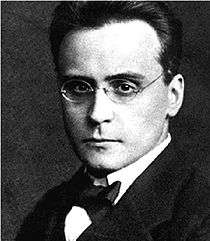List of compositions by Anton Webern

Anton Webern in Stettin, October 1912
This is a list of compositions by Anton Webern, the Austrian composer and conductor.
Works with opus numbers
The works with opus numbers are the ones that Webern saw fit to have published in his own lifetime, plus a few late works published after his death. They constitute the main body of his work, although several pieces of juvenilia and a few mature pieces that do not have opus numbers are occasionally performed today.
- Op. 1, Passacaglia for orchestra (1908)
- Op. 2, Entflieht auf leichten Kähnen for a cappella choir, on a poem by Stefan George (1908)
- Op. 3, Fünf Lieder (Five Songs) for voice and piano, on Der Siebente Ring by Stefan George (1907–08)
- Op. 4, Fünf Lieder for voice and piano, poems by Stefan George (1908–09)
- Op. 5, Five Movements for string quartet (1909); version for string orchestra (1929)
- Op. 6, Six Pieces for large orchestra (1909–10, revised 1928)
- Op. 7, Four Pieces for violin and piano (1910)
- Op. 8, Zwei Lieder (Two Songs) for voice and 8 instruments, on poems by Rainer Maria Rilke (1910)
- Op. 9, Six Bagatelles for string quartet (1913)
- Op. 10, Five Pieces for orchestra (1911–13)
- Op. 11, Three Little Pieces for cello and piano (1914)
- Op. 12, Vier Lieder (Four Songs) for voice and piano (1915–17)
- Op. 13, Vier Lieder for voice and orchestra (1914–18)
- Op. 14, Sechs Lieder (Six Songs) for voice, clarinet, bass clarinet, violin and cello on poems by Georg Trakl (1917–21)
- Op. 15, Five Sacred Songs for voice and small ensemble (1917–22)
- Op. 16, Five Canons for high soprano, clarinet and bass clarinet (1923–24)
- Op. 17, Three Traditional Rhymes for voice, violin (doubling viola), clarinet and bass clarinet (1924–25)
- Op. 18, Drei Lieder (Three Songs) for voice, E-flat clarinet and guitar (1925)
- Op. 19, Zwei Lieder, for mixed choir, celesta, guitar, violin, clarinet and bass clarinet, on poems by Johann Wolfgang Goethe (1926)
- Op. 20, String Trio (1927)
- Op. 21, Symphony (1928)
- Op. 22, Quartet for violin, clarinet, tenor saxophone and piano (1930)
- Op. 23, Drei Lieder for voice and piano, on Hildegard Jone's Viae inviae (1934)
- Op. 24, Concerto for Nine Instruments (1934)
- Op. 25, Drei Lieder for voice and piano, on poems by Hildegard Jone (1934–35)
- Op. 26, Das Augenlicht for mixed choir and orchestra, on a poem by Hildegard Jone (1935)
- Op. 27, Variations for piano (1936)
- Op. 28, String Quartet (1937–38)
- Op. 29, Cantata No. 1 for soprano, mixed choir and orchestra, on a poem by Hildegard Jone (1938–39)
- Op. 30, Variations for orchestra (1940)
- Op. 31, Cantata No. 2 for soprano, bass, choir and orchestra, on a poem by Hildegard Jone (1941–43)
Works without opus numbers
- Two Pieces for cello and piano (1899)
- Three Poems for voice and piano (1899–1902)
- Eight Early Songs for voice and piano (1901–04)
- Three Songs after Ferdinand Avenarius (1903–04)
- Im Sommerwind, idyll for large orchestra after a poem by Bruno Wille (1904)
- Langsamer Satz (slow movement) for string quartet (1905)
- String Quartet (August 1905)
- Piece for piano (1906)
- Rondo for piano (1906)
- Rondo for string quartet (1906)
- Five Songs after Richard Dehmel (1906–08)
- Piano Quintet (1907)
- Four Songs after Stefan George (1908–09)
- Five Pieces for orchestra (1913) - related to op. 10, first pub. 1971, edited by Friedrich Cerha
- Three Pieces for String Quartet and Mezzosoprano (1913)
- Three Songs for voice and orchestra (1913–14)
- Cello Sonata (1914)
- Piece for children for piano (1924)
- Piece for piano, in the tempo of a minuet (1925)
- Piece for string trio (1925)
Arrangements
- "Thränenregen", "Ihr Bild", Romance [from Rosamunde], "Der Wegweiser", and "Du bist die Ruh’", by Franz Schubert, arranged for voice and orchestra (1903)
- Schatzwalzer by Johann Strauss II for string quartet, harmonium, and piano (1921)
- Chamber Symphony No. 1, op. 9, by Arnold Schoenberg, arranged for flute (or violin), clarinet (or viola), piano, violin, and cello (1922–23)
- Arbeiterchor by Franz Liszt, arranged for bass solo, chorus, and orchestra (1924)
- Deutsche Tänze (German Dances) by Schubert (1824, drawn from D.820), orchestrated by Webern (1931)
- Fuga (Ricercata) a 6 voci [Fugue No. 2] from Johann Sebastian Bach's "Musical Offering", orchestrated (1934–35)
See also
This article is issued from
Wikipedia.
The text is licensed under Creative Commons - Attribution - Sharealike.
Additional terms may apply for the media files.